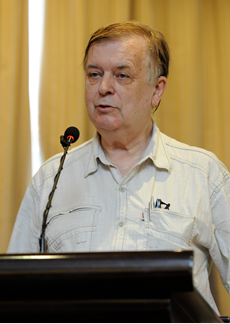The Speech of Professor Gudmundur Alfredsson

Professor Li, Professor Sang, President Tsui, all our dignitaries, ladies andgentlemen, I am going to get some help with interpretation.
In 2011, the UN General Assembly adopted anew declaration on human rights education and training. It was more than 60years after the adoption of the Universal Declaration of Human Rights—hightime—but it’s a good declaration from 2011. It addresses human rights educationat all school levels, in all disciplines, and for a variety of relevantofficials. It makes good sense and isabsolutely essential for the successful introduction of a human rights culturewhere people will know their rights, and where officials will know how toconduct their business and know the limits of their power.
I’ve been engaged in this type of work forsome 30 years now, much of it in human rights education and training, also insome technical cooperation and monitoring work, and I thought today, with thisevent, it was a good occasion to maybe draw a few lessons—I could go on for along time—but I wanted to mention four lessons that one has acquired from thisexperience.
1. Human rights are popular. People wanthuman rights for themselves, and people want to know what are their rights.There is a thirst for this knowledge. And in my mind, notwithstanding all thepossible theories you have backing up human rights, this is the strongesttheoretical background for human rights and human rights education that I havebeen able to come up with.
2. I believe a good basis for human rightseducation are the international standards—of course combined with internationallaw. But the international standards do have the advantage of coming along withthe consent of states when treaties are ratified, when customary law emerges.And that way, we overcome our void—the differences that will flow fromphilosophical or religious or political approaches to human rights, so Ibelieve international human rights law has a great future and a great reasonfor us to promote it further.
3. Human rights education should beseparated from human rights monitoring. Human rights education should be positive, based on the legal standards we have, and isfor people in each country to learn the lessons from that and import them andimplement them when they see fit.
4. And I think that will be the finallesson that I mention today, it’s nice to work in the field of human rightseducation because you meet interesting people. You meet people who are engagedand involved and very often committed to new developments in society. Thingsare happening and I think a good demonstration for that in a way is my ownlimited experience in China. I came here first 20 years ago, and we wereallowed to organize meetings on international law, but not on human rights. Wewere, in the first several years, having a monologue in these meetings.Foreigners would speak and Chinese delegation would politely listen. Thisperiod was followed by a dialogue—when the foreigners would speak, and it was aChinese position, but it seemed as though all the Chinese in the room had the sameopinion. Today, and now for several years, in the human rights education room,there is a lot of opinions. There is a multilogue—the Chinese discuss amongthemselves, they do not always agree, they certainly feel free to disagree withus foreigners, engage their lively discussion, and I find this development isvery very encouraging, and demonstration of the art of the possible and of thegood and interesting people you meet.
During my work in China, I’ve mainly beenassociated or attached to two great institutions, the Raoul WallenbergInstitute of Human Rights from Sweden, and more recently, with China Universityof Political Science and Law, and their Human Rights Institute, now one of thenational centers for human rights education. I’ve just been there for two weeksin a summer school for human rights. This spring I was there teaching a wholecourse in the master’s program, and I must say, I find that experience alsovery encouraging, in terms of the students, the staff, the research beingundertaken, new publications, the type of human rights spirit in the air thateventually is going to make a difference. This may be difficult for ?---? to translate because he is the director ofthe institute, but I ask him to translate it faithfully anyway.
I want to say many things for the prizethat I have just been awarded. I got a translation of a statement describing myactivities, and it was so nice and so positive. I am not sure I recognizedeverything in it, but it was heartwarming. I accept this prize with humilityand gratitude, and in my mind, more than anything else, it will serve asencouragement to continue doing more of the same thing. Thank you very much.

